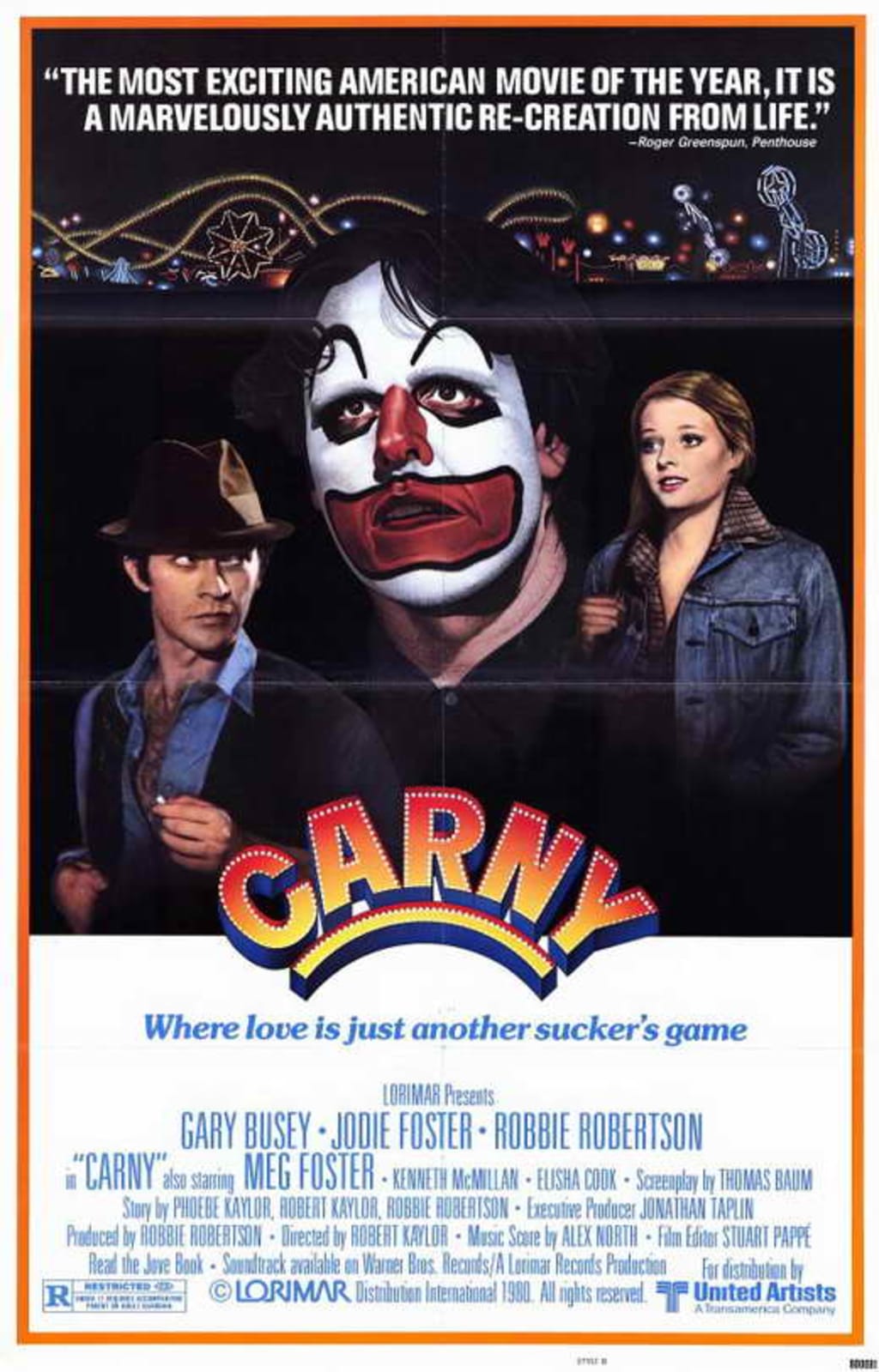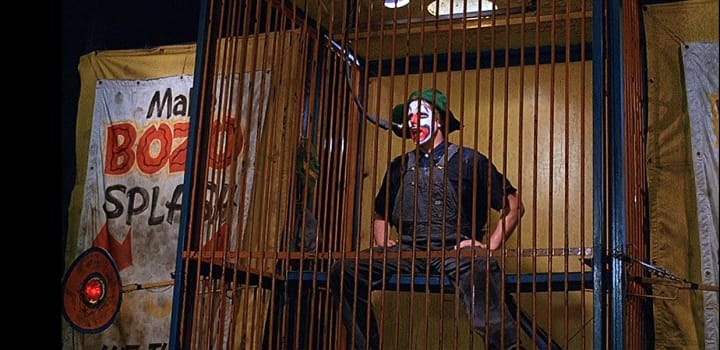
It isn't often a film starring Jodie Foster and Gary Busey actually brings to mind passages from The Satanic Bible. But, watching the incredible film Carny (1980) again after so many years, I couldn't help but be reminded of this:
"On Saturday night, I would see men lusting after half-naked girls dancing at the carnival, and on Sunday morning when I was playing organ for tent-show evangelists at the other end of the carnival lot, I would see these same men sitting in the pews with their wives and children, asking God to forgive them and purge them of carnal desires. And the next Saturday they'd be back at the carnival or some other place of indulgence. I knew then that the Christian church thrives on hypocrisy, and that man's carnal nature will out no matter how much it is purged or scoured by any white-light religion." -Anton Szandor LaVey
And the good (good?) Doktor was just being candid. He saw the world as one vast, sleazy Midway, a dirty, dusty carnival of hucksters and barkers and pitch-men, all hawking their rigged games, their short cons; all looking for that easy mark. That mark is most all of us; because man is a carnal creature, a spiritual child, and he's forever the dubious dupe of some arcane ogre or frightful faerie, each with a two-bit "treasure" or some glamorous "magic dust" to sell the unworldly, naive, but undeniable greedy and easily tempted (and eternally waiting for that one elusive magic pill that will stave off his or her existential horror) --yokel.
Sucker.
MARK.
And this is where the movie Carny resides. We're introduced, right off the bat, to Frankie (Gary Busey), putting on his clown makeup in front of a mirror. He hacks and coughs, but that is because his carnival job is to sit in a little "dunking booth" with iron bars, insulting and goading on rowdy, drunk townies who pitch balls at him. Occasionally, one hits the mark, and he tumbles from his perch into the shallow tank below.
His buddy is the rather dapper "Patch" (musician and producer Robbie Robertson), a man that exudes a kind of menacing, reptilian charm. His exterior panache hides a lethal and deadly stiletto edge, however; as he proves by holding a straight-razor to the throat of Jodie Foster's unappetizing, bonehead boyfriend (Craig Wasson).
Donna (Jodie Foster), bored and frustrated with her life, decides, in the manner of all refugees from an unrewarding existence, to take Frankie up on his offer and join the Great American Carnival on its tour. Patch is less-than-thrilled with the arrangement (it is his job to "patch" over any difficulties with local law enforcement or the criminal underworld. Hence, the name), and the friction engendered by it becomes increasingly apparent. Meanwhile, Patch is tasked to "grease the palms" of crooked cops and menacing hoods alike; giving away huge amounts of free passes, protection money, and doing what amounts to a little pimping with a girl from the "kooch show" (i.e. strip show). It's all in a day's work, but it exposes the ugly underbelly of the carnival world and "Southern sleaze."
Life is not easy for the carnies; bad food, lousy weather, rowdy townies. But they have their own language, their own sense of loyalty and love; their own unwritten codes. Donna, in order to earn her keep, agrees to be a "side girl" at the kooch show--in other words, a backup dancer in a sexy costume that doesn't actually take her clothes off.
Patch, vindictive as hell, arranges with carnival owner Heavy St. John (the late character actor Kenneth McMillan, who is perhaps most famously remembered as a floating monstrosity in David Lynch's 1984 version of Dune) to, instead, have her "work strong." She's thrust forward, unprepared, on stage, and expected to strip. She freezes, and drunk rednecks jump on stage and try to pull her off.
She's later given a rigged game to supervise, coached in it by the drop-dead gorgeous Gerta (Meg Foster), where she sits on the counter with a weird handful of what look like strings hanging from different "prizes." This leads to a playful scene with a lesbian couple, wherein Foster comes-on to the woman; real shocking stuff in 1980, I'm sure, but it wouldn't raise an eyebrow today.
After her successful con, the inevitable happens, and Patch and Donna fall into bed together. They are discovered by Frankie, who is in a panic at some criminal hoods and townies wreaking havoc at the various games.
Nails (Theodore Wilson) was forced to pull a gun on Skeet (John Lehne) after he got tough upon losing a lot of cash at a game. Skeet and his repugnant buddies, henchmen for a local, minor criminal boss that has previously been rebuffed after trying to shake Great American down, run rampant through the carnival, running over "On-Your-Mark", a very weird, seemingly schizophrenic carny (played by the late, great Elisha Cook, Jr.) and killing him.
Frankie, only wearing a thin shadow of his clown disguise, goes to sit in his dunking booth, enacting his usual insulting spiel, goading the criminals with a volley of his harsh, gravelly throat verbal abuse, into jumping the barricade and attacking him. They mange to pull the thing over with him in it.
Meanwhile Marvin (Bill McKinney), the sleazy southern crime boss tries to shake Heavy St. John down for an exorbitant amount of cash--as well as a piece of Donna's ass. St. John agrees, but with a plan in mind. He goes to Donna, about to depart, and begs her to help him get this guy. She so agrees, and here it is where the denouement of the film really happens.
Donna tempts Skeet into what he thinks will be a sexual liaison. Instead, he is drugged and kidnapped. Next, Marvin is lead into what HE thinks will be a rendezvous with Donna--but is, instead, a meetup with a "half and half" (i.e. half woman, half man). He is then toured through the freak show, introduced to sword-and-fire swallowing performers, contortionists, midgets, but then finally being shown what he assumes is the torso of Skeet--a horrific body that appears to have a severed head.
But, as are all things in the carnival, appearances can be deceiving.
The movie ends with the three--Frankie, Patch, and Donna-continuing on their way, Patch and Frankie having patched things up. The implication at the end is that, next year, it will be Patch's show, after St. John retires.

One of Us
"Gooba gabba, we accept you, we accept you, one of us!"
Thus is intoned the acceptance of the freaks, from director Todd Browning's 1931 classic Freaks--an infamous film that was initially banned because of the shocking presence of actual carnival performers and old-time sideshow persons; i.e. the deformed. ironically, people that most conventional types would pay then a nickel to see were deemed just too shocking for the silver screen. At least, in that repressed era.
The story of Freaks is based on a novelette by Todd Robbins called "Spurs" (1923), in which a midget enacts revenge on a cruel trapeze artist, making her into a human pony to ride about. In Browning's film, we get the far more hideous image of the trapeze artist turned into a "chicken lady." The ending is a cautionary one: don't violate the "Code of the Freaks." Don't abuse their kindness to you OR YOU WILL PAY.
The ending of Carny brings to mind, was certainly inspired by, the ending of Freaks. Donna is accepted fully into the family of carny folk after she has helped them enact revenge for the death of On-Your-Mark.
Instead of an illusory "chicken lady," we get the spectacle of Skeet's headless torso.
The other film Carny recalls, 1946's Nightmare Alley, starring Tyrone Powers (based on a novel by William Lindsey Gresham), is the story of a young man who first joins the carnival as a "What Is It?"-type exhibit, before joining the Mitt Camp (i.e. fortune tellers) as a phony psychic. He then leaves this to start a fraudulent spiritualist church, setting himself up as a fake medium. He is wildly successful at this (shades of the real-life story of M. Lamar Keene, revealed in the book The Psychic Mafia). Nightmare Alley lays open the ugly fact that people eager for a phony miracle will pay any amount of money, believe anything and everything you tell them, just for that little glimmer of fool's gold to be placed in their palm for one white-hot moment.
Carny covers much the same territory, revealing the ugly, sordid existences of carnival folk, the seamy underbelly of the old southern sleaze circuit, wherein every palm must be greased, every local thug paid tribute to, or else the show cannot go on. The violence, bad food, squalid conditions are all offset by the colorful assortment of actual sideshow performers. They are not here to be made fun of, or even oogled. When we see the Fat Man bathing in a rainstorm, it is with the feeling that such a man, imprisoned in his own body, must exalt in such an escape. He is robed, of course, but the effect is the same.
These men and women are not endearing, cute, or appealing--but they exist, the filmmaker seems to say, and they are their own family, their own kin. They are marginal, misfits; outcast people--but human, nonetheless. You can push them, Mr. Normal --but only so far.
Don't violate the code of the carnies. Don't break the Law of the Freaks.
Or you will pay.
Donna is finally accepted into the inner circle of this unique, strange family. She's learned to hustle, to "work strong." Carny exposes the various marks and rubes for what the are: lustful beasts; ugly, greedy, naive, stupid, vulgar--man in his natural element; the world as a cheap hustle. What is the Seventh Satanic statement? It is:
"Satan represents man as just another animal, sometimes better, more often worse than those that walk on all-fours, who, because of his “divine spiritual and intellectual development, has become the most vicious animal of all!"
You better believe it.
Carny is finally Donna's story, and her story is just the familiar story of how a young girl at last finds acceptance and a place in the ranks of a very exclusive society; a "family," if you will. How she becomes one of them.
Gooba-gabba.
About the Creator
Tom Baker
Author of Haunted Indianapolis, Indiana Ghost Folklore, Midwest Maniacs, Midwest UFOs and Beyond, Scary Urban Legends, 50 Famous Fables and Folk Tales, and Notorious Crimes of the Upper Midwest.: http://tombakerbooks.weebly.com
Reader insights
Outstanding
Excellent work. Looking forward to reading more!
Top insight
Expert insights and opinions
Arguments were carefully researched and presented






Comments (1)
Excellent review, I need to rewatch this and will do soon